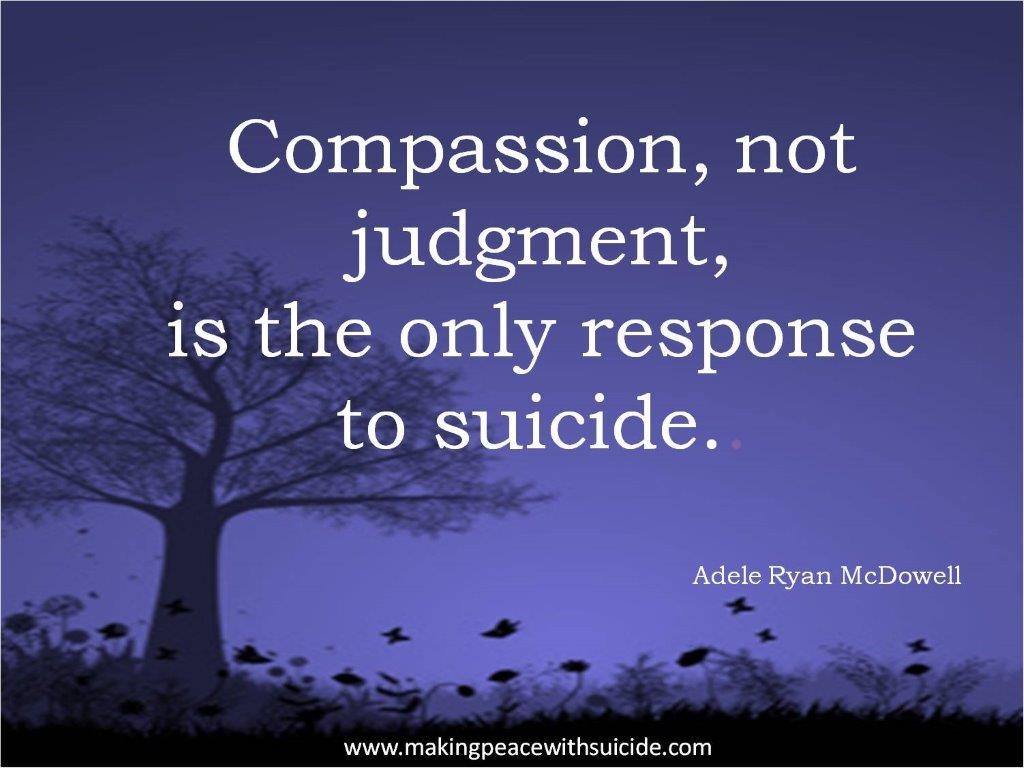Too often suicide is met with judgment, criticism, shame, and taboo. Suicide is the result of a confluence of stressors, circumstances, and experiences. It is an individual response to pain of every shape, size, and dimension. Suicide leaves a rippling wake of shock, horror, and grief. Isn’t it time we pull suicide out of the shadows and meet it with compassion?
Blog
Grief is akin to pulling on your hip waders
 Grief is akin to pulling on your hip waders and walking into the deep, murky water of your psyche, the home of your inner life, where there are churning emotions and roiling thoughts along with forgotten bits and pieces.
Grief is akin to pulling on your hip waders and walking into the deep, murky water of your psyche, the home of your inner life, where there are churning emotions and roiling thoughts along with forgotten bits and pieces.
The footing is rocky, uneven, and unpredictable. You never quite know what will slide up against you or tangle your footing. There is so much you cannot see or discern beneath the waters.
You move slowly and tentatively forward, sweeping debris and sludge away from your person, and choking back tears. Sometimes, you stand stock-still until there is enough fortitude to take another step.
It’s an arduous, crazy-making process. And it’s a game-changer, too. Your worldview is forever changed, and your heart is re-assembled.
And, still you stand: An Ode to Grief
 Loss hammered you incessantly. Grief hollowed you out until you were gasping for breath, empty and fully spent. Your heart was broken and battered into a heap of crumbled bits and pieces. And still, you stood.
Loss hammered you incessantly. Grief hollowed you out until you were gasping for breath, empty and fully spent. Your heart was broken and battered into a heap of crumbled bits and pieces. And still, you stood.
Anguish carved you open in unexpected and totally disorienting ways. You lost your footing; you lost your way. Nothing made sense anymore. There were moments when thoughts of your own death seemed like a cool pillow on a sleepless night, blessed relief for the heated pain that endlessly coursed through you. And still, you stood.
You stayed alternating between almost-catatonic numbness and torturous, cycling agony. You kept inching your way through the thick, clinging muck of grief and memory, holding pictures and words and touch to your heart. Again and again, you relived the moments and slices of life you spent together. You were not going to forget a single nanosecond. Ever. Excruciating and tender and filled with an unspeakable sorrow, they remained your most precious — and, sometimes, were almost your complete undoing. And still, you stood.
Your will to carry on flickered like the sputtering end of a candle. You were done, so done. You tattooed your feet with the words so you would remember how to walk forward each day. You tattooed your arm so you might lift it again some day, in a distant future, a different reality.
You walked miles in and out of sleep. You scribbled and cut and pasted your life like puzzle pieces looking for a different outcome. You did anything to feel something different, something not so painful. You were bleeding tears. And yet, still you stood.
God was an anathema. Perhaps not permanently, but in the dark days of grief when it felt like a boa constrictor was squeezing the life out of your heart, nothing felt good or right or meaningful or symbolic. You were furious with God. This was not supposed to happen. You found yourself staring at a crevasse into which you might plunge. You clutched brown plastic bottles of pain pills and clear, slick glasses of drink, but there would never be enough to eradicate the pain you felt. And yet, still you stood.
People said such stupid things to you. So unthinking. Their words stabbed. They tried too hard — or, maybe, not enough. Just tell me stories, you screamed in your head, and don’t forget. You didn’t give a flying fig about angels at that moment. You wanted your flesh and blood.
Minute by minute, you crawled through the aftermath of endless hours and days. You were scattered and aimless, forgetful about the present and precise about the past. You curled into a fetal position and rocked in disbelief. Memories and scents and sounds clattered noisily through your psyche and kept you awake, wandering wide-eyed through rooms in the middle of the night. And still, you stood.
Your heart was broken open. You became vulnerable and unbearably fragile. Grief spread-eagled you into expanded states of awareness. You became sensitive to the slightest nuance of pain. You learned all too well the effects of loss. Tears slipped from your eyes without the slightest provocation. You were forever changed and permanently altered. Through sheer will and determination, you slowly re-entered the flow of daily life. It took such guts to pretend normality. And still, you stood.
There are still days when everything clicks into those “before” moments, and the focus becomes sharp and raw anew. You had no idea you could be so courageous and strong and defiant. You had no idea you could be so dangerously close to implosion. Your once-shattered heart has been re-imagined. Love has become a more tender kind of language. And still, you stand.
Let’s not declare war on suicide, let’s make peace
 Suicide is a not a target, or an adversary. It is an individual response to a confluence of factors.
Suicide is a not a target, or an adversary. It is an individual response to a confluence of factors.
If we want to address suicide, then we must sink down into the essentials and deal with the factors that contribute to suicide. And those factors are how we treat one another and ourselves. It is that basic.
Why not embrace differences, understand commonality, and reinforce the idea of oneness? We are all connected. Let’s go for bridge-building. Let’s develop our C.Q., our cultural quotient, so that we understand one another better. Let’s make room at the table for everyone. We can agree to disagree, and we can find the common thread in our shared human experience.
Why not expand our perspective and provide tools? Let’s raise our E.Q., our emotional quotient, and gain mastery. Let’s become fluent in emotional intelligence so that we can talk to one another, express our anger, and deal with conflict in an effective way. We can have healthier relationships. Let’s teach energy techniques and self-healing modalities, like HeartMath®, Reiki, Therapeutic Touch, and shamanism, for self-empowerment, resilience building, and an increased understanding of the power of personal energies.
Why not change our focus? We can increase cognitive dissonance around bullying, unethical behavior, and violence. We can work toward eradicating the learned responses of shame and fear. We can promote cooperation vs. competition; and we can make life-work-balance a priority. These are possibilities and options to create a healthier and happier society.
Speaking of priorities, how we treat our children says volumes about our societies. Let’s feed, house, clothe, and educate our children. Why are any children on this globe going to bed hungry? Let’s address childhood sexual abuse, sex trafficking, and domestic violence. Children are in crisis—and they are our future.
Let’s share our burdens by practicing empathy and cultivating compassion. We need to walk in one another’s shoes. Let’s give our wounded the help they need. Mental health services, VA services, and the like are in dire need of public support and funding. Substance abuse requires more long-term treatment strategies. Why is this problematic?
And if we are to address the pervasive soul loss, then we need to honor the soul. We can move toward that by rebalancing priorities, respecting Mother Nature, healing Mother Earth, celebrating the arts, course-correcting the pace, being open to creative expression, and developing more meaningful ways of connecting with one another.
And, lastly, we need to live peace, with ourselves and with others. If we cannot accept ourselves, if we feel we are forever unworthy, we will act in ways that can have enormous ripple effects. Peace is a five-letter word that offers relief and healing. And it starts with each of us.
When you are ready, this can help you heal from a loss by suicide
 Remember the theme song from the show M*A*S*H? (“Suicide is painless…”) Alas, that is so not the case.
Remember the theme song from the show M*A*S*H? (“Suicide is painless…”) Alas, that is so not the case.
Your loved one’s suicide is the day you stop taking a full breath; the day you are left holding your broken heart in your hands; the day time stands still; and, unfortunately, the day people talk about, avoid or even blame you.
Suicide leaves you, the surviving loved one, holding the bag of squirming emotions and memories. There is the taint and taboo, guilt and remorse, rage and despair, confusion and regret, and the shame or guilt that somehow — in some possible way — you are responsible. You are left in a wake of jumbled emotions and self-doubts.
Suicide turns your life upside down. You find yourself vibrating with shock, disbelief, grief and, most likely, trauma from what you witnessed or envisioned in your mind’s eye. It is an enormous challenge to find yourself again and reclaim your desire to live fully after such a devastating loss.
How do you make sense of this kind of heartbreak?
Read more here .
How do you make sense of a sudden death?
 The question, itself, must be a Zen koan, because, really, there is no answer to sudden death. There is no making sense of the unreal, surreal, or unbelievable. Yet, it happens, day in and day out.
The question, itself, must be a Zen koan, because, really, there is no answer to sudden death. There is no making sense of the unreal, surreal, or unbelievable. Yet, it happens, day in and day out.
One week, I was called to assist (in a grief-counseling way) at a work place. Over the weekend, a young, happy, and seemingly healthy mom died suddenly during the day; she was discovered on the floor of her home. She left two small children and a husband as well as a number of long-term coworkers, all reeling in disbelief.
These days, work hours are often longer than the “awake” hours at home. There is the press and drive of companies today coupled with an employee’s motivation to do well, get ahead, and earn more. Certainly, coworkers can become extended family.
And like family, they are doubled over with grief. The thought of their coworker’s children without a mother renders many speechless; the thought of their own children without a parent is unbearable.
Death of a loved one is a trigger; it reminds of all our other losses. It’s as if we each hold a memory box close to our heart which is usually closed. Yet, with a new loss, the box springs open with our personal well spring of grief and sorrow. There is a parade of visceral memories and sensations. In life, we do not forget death.
And, then there was a young man, 18 years of age, ready – in mere days — to graduate high school, was found with a book on his chest looking as if he had drifted off to sleep while reading before bed. His family, his school, and his town are shattered. There are no words; there is no comfort, at this moment. The promise and potential of his life unlived casts a pall over everything.
And his death becomes the uninvited guest at his classmates’ graduation, where, undoubtedly, parents will hold their children a little bit tighter and say, “I love you” with a tear-filled eyes. And these parents will wonder how they could ever survive the loss of their child. The idea is unfathomable.
Sudden death hits like an enormous, out-of-the-blue thunderclap to the heart. It is a sucker punch to the gut. You search your brain thinking that this can’t be true. One minute the person is there; the next minute they’re gone. Like a flame extinguished, you are plunged into a darkness that is incomprehensible and, often, crazy-making.
And you try to make sense of it all; you retrace your steps. You race back in time to the very last connection you shared. You think of the “Goodnight, honey” or the “Don’t stay out too late” to a family member or the “Have a good weekend” to the coworker on her way out the door. The everyday words, the daily connections seem so trivial and unimportant given the enormity of the loss, but they are the connective tissue of life.
And your mind, like a Google search engine, comes up with all the related memories and associations. You remember the shared laugh over a quick cup of coffee. You think of the sharp words about keeping the curfew or who is going to pick up the quart of milk, the dry cleaning, or the babysitter.
You remember yesterday, last week, last year, the day they were born, the day you got married, the day they walked into your class, your job, your life. Whenever and whatever those points of intersection, the moments of laughter and love, the hard times, the good times, the better times, you want to remember it all — in vivid, painstaking detail.
Images and words jump to the fore. Your knees buckle at the image of reading him a bedtime story or brushing her hair. Bath time, bedtime, play time, sleep time, making love time, not-speaking time; it all spreads before you, a map of your life with them.
What you shared was real; it was so very, very real. And you find yourself choked up; words, memories, and feelings are caught in your throat and chest. It is difficult to take a deep breath. Everything feels so fragile and precious now. It is hard to navigate these uncharted waters; you lurch from side to side feeling broken into a million little pieces never to be whole again.
So, how do you make sense of a sudden death?
Be very, very gentle with yourself. It is hard, exhausting, excruciating work to make sense of the un-sensible and to unpack and repack a life that you have held with such reverence and tenderness.
Take all the time you need to feel all that you need to feel.
Take all the time you need to remember and revisit all that you experienced and shared with the one you lost.
There will be a day when you do not weep.
There will be a day when you surprise yourself with a small laugh.
There will be a day when your heart’s heaviness has lifted.
And there will be a day, when like a tiny blade of grass that pushes through a crack in the cement, you will be ready to take a step forward and be in the sunshine.
And until that day comes, allow us, your family, friends, and coworkers to walk with you and share the loss. It is primal; this connection that we feel when we hear of death, especially the deaths of the younger ones.
There is a ripple effect; the loss moves out in ever-widening circles and whoever hears or knows anyone impacted by the loss wants to do something. Make a meatloaf, bake lasagna, make the calls, organize logistics, walk the dog, be a shoulder, lend an ear.
We want to feed you, nourish you, and hold you. We want to help you stay afloat when you are drowning in heartbreak. We feel your loss; your loss becomes our loss.
Loss is a universal, and the experience of loss is most commonplace, although it feels anything but common. With loss, there is a part of us that wants the world to s-t-o-p and pay heed. Don’t you understand, we have lost our loved one. Yet, life goes on and you find yourself retreating from the din and dailiness.
Loss sends out the call to gather. Hear ye, hear ye, all family and friends, it is time to circle the wagons. It is time to stop and attend. It is time for reverence and remembrance.
Jungian analyst, poet, and cantadora (keeper of the old stories), Clarissa Pinkola Estes tells us that the wise, elder women of her family would say, “The only miracle medicine we have is each other.” And so it is, even in sudden death.
To all families going through such a difficult time now, may you find peace and comfort during your dark days.
Even a big heart
This is no ordinary goodbye
Suicide leaves you in a complicated place.
Grief and trauma are intertwined.
This is no ordinary goodbye.
Go gently.
Be kind to yourself.
Take as much time as you need.
Remember.
Cry some more.
Rant and rage.
Love some more.
It’s all ok.
In fact, it’s perfect.
Your heart will lead you
into a place of shelter.
Take precious care.
This is no ordinary goodbye.
The connection between suicide and childhood sexual abuse
 It’s September and we are honoring suicide awareness and suicide prevention. To that end, we are sharing again some of our most popular posts.
It’s September and we are honoring suicide awareness and suicide prevention. To that end, we are sharing again some of our most popular posts.
Circling the international news is the story of the assisted suicide of a young Dutch woman due to long-term childhood sexual abuse. This woman in her 20’s asked for — and was granted — euthanasia by lethal injection.
She requested an end to her life due to intractable trauma (i.e., severe Post-Traumatic Stress Disorder) and concomitant medical issues (i.e., advanced anorexia, chronic depression and hallucinations) that left her primarily bedridden.
Her story has raised questions and concerns.
As a mental health professional who has worked first-hand with childhood sexual abuse survivors, I have witnessed the repercussions of the compounded and complicated trauma of childhood sexual abuse.
Read more here.
Understanding the stranglehold of Big Grief
We are hard-wired for connection and when a meaningful connection is severed – be it someone who has held a special place in our personal firmament of love and affection or someone who has betrayed and abandoned us — we feel devastating loss.
Loss of this magnitude births grief – grief for what was, what is now and what will never be. Big Grief brings you to your knees. How can the world continue to spin when your world has stopped?
Inside, you can’t stop howling. Night after night, you howl until your voice is gone. You sleepwalk through your days, unable to connect the dots of your new reality. You barely function. You sit on the edge of hysteria.
Grief places a stranglehold on your heart. Your world contracts and constricts. You can’t take a deep breath. Grief holds your breath in shallow field now made fallow with loss. It’s impossible to unclench the tension that locks your body in pain and, even, fury. Your days and night wind endlessly in an ever-tightening knot held buoyant by your tears. Everything has been squeezed out of you. It hurts. It hurts like hell.
It’s hard to imagine there is life beyond your exploded heart. How can you possibly merge back into the cacophony of dailiness and demands when your life has been captured by grief? The hollowness, the memories, the break-downs, the images, the gut-wrenches, the what-ifs have kneed you into a tight, dark corner.
The pain, akin to a high fever, has kept you writhing and sobbing in unrelenting deliriums. The raging intensity of the hot pain eventually crescendos and breaks. You are left shivering in disbelief. You re-enter the world, shaky and vulnerable. Blinking and staring blankly, you emerge with a heightened sensitivity to everything around you. You feel fragile and raw, as if you are wearing new skin. You want blankets and covers and comfort. You take in nourishment and emotional sustenance, spoonful by spoonful.
Your re-emergence cannot be rushed. A part of you has died and another part of you is being reborn. Your struggle has been enormous, one that has left you hanging perilously close to the edge. You have been so very brave.
The splinters of your shattered heart were deeply embedded in your psyche. Slowly and painfully, you extracted their pierced shards. You laboriously pieced together, tiny bit by tiny bit, a new heart, spread-eagled by pain and re-imagined with love and courage.
It has taken a Herculean force of will and enormous personal strength to break out of the tight, madness-filled constriction of grief and to move beyond the darkness.
The world is no longer the same. You are no longer the same. You have new eyes with which to discern the essentials of life. You see more deeply; you can read the soul. You swim in depths heretofore out of your reach because you have learned to hold the tension of opposites.
No longer are you constricted by grief. Now, you can take a deep breath. Now, you are ready, albeit gingerly, to embrace life once again.
The loss of your loved one does not disappear or evaporate, nor is it diminished. Your loss is re-configured. Your grief has been absorbed and incorporated into your being. It’s a forever part of you that has re-arranged your being on a cellular level.
This Big Grief has expanded your heart – a heart that now has the capacity to cradle both the light and the dark.
You have broken the stranglehold.
This article also appeared on The Huffington Post Canada under the title “You Can Survive the Torture of Big Grief.”


